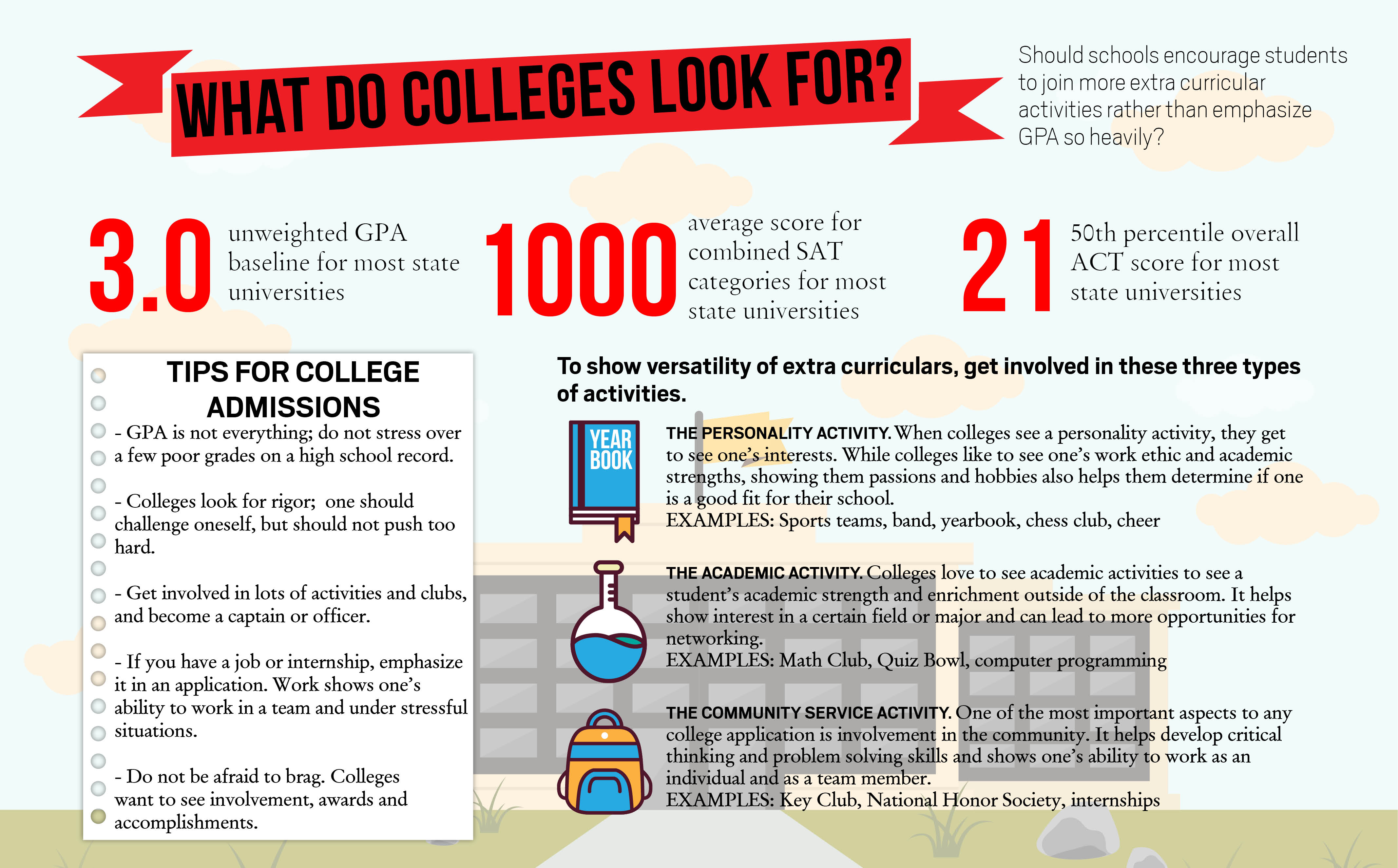As high school students work through rigorous classes and coursework, grade point averages become a nerve wracking portion of college applications. While GPA plays a role in college acceptance, students should not focus on grades alone.
Grades definitely give insight into one’s ability to manage coursework, but colleges do not depend solely on grades. For example, University of Florida created an application that factors both GPA and extracurriculars on a 50/50 scale. In fact, larger and competitive universities usually only spend five to ten minutes looking at each application and smaller schools may spend about 15 minutes, according to Eric Furda, Dean of Admission at University of Pennsylvania. Admission deans need time to read over application essays, so grades often do not get an equal amount of attention.
Universities want to see performance in extra curricular activities and community service. According to Michigan Future Inc., 70 percent of CEO’s held an office of a club in their school experience, showing leadership in younger years can lead to positive success in future occupations. Involvement in extracurriculars shows one’s ability to manage time, develop social skills and contribute to the community. This provides an important component to college applications, as it tests one’s abilities when faced with social challenges.
Involvement in extracurricular activities can also lead to higher SAT scores. According to National Center for Education Statistics, participation in extracurricular activities correlates to student’s attendance, GPA, test scores and expected educational goals, which all can help increase the likeliness of college acceptance.
According to Jack Dvorak, Professor of Journalism and Director of the High School Journalism Institute at Indiana, kids who participate in a journalism publication in high school performed in the 81st percentile on SAT, performed better in their entry level college English classes, participated in more clubs and leadership roles and excelled in comparison to other students in ten out of 12 academic areas. Participation in academic clubs allow students to perform better in college. College admissions officers know this, which is why they look at one’s involvement too.
GPA does not always matter when applying for future occupations. When going in for a job after college graduation, one is not asked about one’s high school ranking. Additionally, colleges understand that high school means more than high grades. Greg Roberts, University of Virginia admissions dean, said grades are “pointless.”
However, for those who struggle with their grades, various schools offer scholarships and opportunities, almost like “second chances,” to those who show academic potential in college. For example, David Letterman, a renowned comedian, established the Letterman Telecommunications Scholarship at his alma mater, Ball State University, for telecommunications minors and majors. The scholarship focuses solely on a student’s creativity, rather than his academics, awarding the overall winner with $10,000, proving that not every university sees academic potential and a high GPA synonymously.
If GPA became a factor in a job application, it would not provide an accurate representation of one’s success and work ethic. Grade inflation illustrates an improper representation of a student’s ranking in comparison to other students. If one student deserved a B, and one student deserved an A, but both received A’s because of a teacher’s test curve, extra credit and other grading policies, it makes colleges and employers jobs harder to differentiate the stronger candidate because of an unfair increased grade for another student.
Furthermore, students stress over acceptance to their dream college, and certain stigmas come with community colleges and online schools, such as Valencia. All universities offer similar programs and basic education for the first two years. Valencia offers smaller class sizes in comparison to larger universities at a fraction of the cost. One of the main differences is the overall “college experience” and ambience of certain state universities.
Overall, one should keep in mind that colleges like high GPA’s, but focusing only on school work should not comprise all of a student’s strength. Colleges look for more well-rounded candidates. High school allows students to find their strengths and passions and excel in them, and colleges want to hear about that student success. GPA signals to colleges a student’s abilities but will not provide the only factor to college success. So students should calm down, and stop overthinking.

